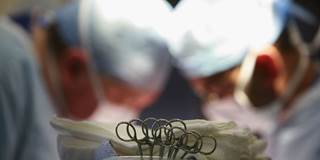Five billion people worldwide lack access to safe, affordable surgical and anesthetic care. But improving access to surgery when needed would not only be good for people’s health; it is also one of the best ways to boost economic productivity in low- and middle-income countries.
BOSTON – On a recent trip to India, I hailed a rickshaw that was pedaled, I soon noticed, by a man with a lame leg. It turns out that a few weeks earlier, the driver had been hit by a car while navigating the busy streets of New Delhi. Although he had managed to obtain medication from a local pharmacy for the agonizing pain – probably because his leg was broken – he could spare neither the time nor the money to see a surgeon.
This type of tragic calculus is strikingly common. The Lancet Commission on Global Surgery estimates that some five billion people – almost 70% of the world’s population – lack access to safe, affordable surgical and anesthetic care, while 33 million people are saddled with unbearably high health expenses. Not surprisingly, the global poor suffer disproportionately: while low-income countries are home to close to 35% of humanity, they account for just 3.5% of all surgical procedures.
One of the biggest obstacles to achieving universal health coverage – which the United Nations has declared a global goal – is financing. And, paradoxical as it may sound, one of the best ways that governments can get the money they need to expand coverage is by making surgery more widely available.

BOSTON – On a recent trip to India, I hailed a rickshaw that was pedaled, I soon noticed, by a man with a lame leg. It turns out that a few weeks earlier, the driver had been hit by a car while navigating the busy streets of New Delhi. Although he had managed to obtain medication from a local pharmacy for the agonizing pain – probably because his leg was broken – he could spare neither the time nor the money to see a surgeon.
This type of tragic calculus is strikingly common. The Lancet Commission on Global Surgery estimates that some five billion people – almost 70% of the world’s population – lack access to safe, affordable surgical and anesthetic care, while 33 million people are saddled with unbearably high health expenses. Not surprisingly, the global poor suffer disproportionately: while low-income countries are home to close to 35% of humanity, they account for just 3.5% of all surgical procedures.
One of the biggest obstacles to achieving universal health coverage – which the United Nations has declared a global goal – is financing. And, paradoxical as it may sound, one of the best ways that governments can get the money they need to expand coverage is by making surgery more widely available.